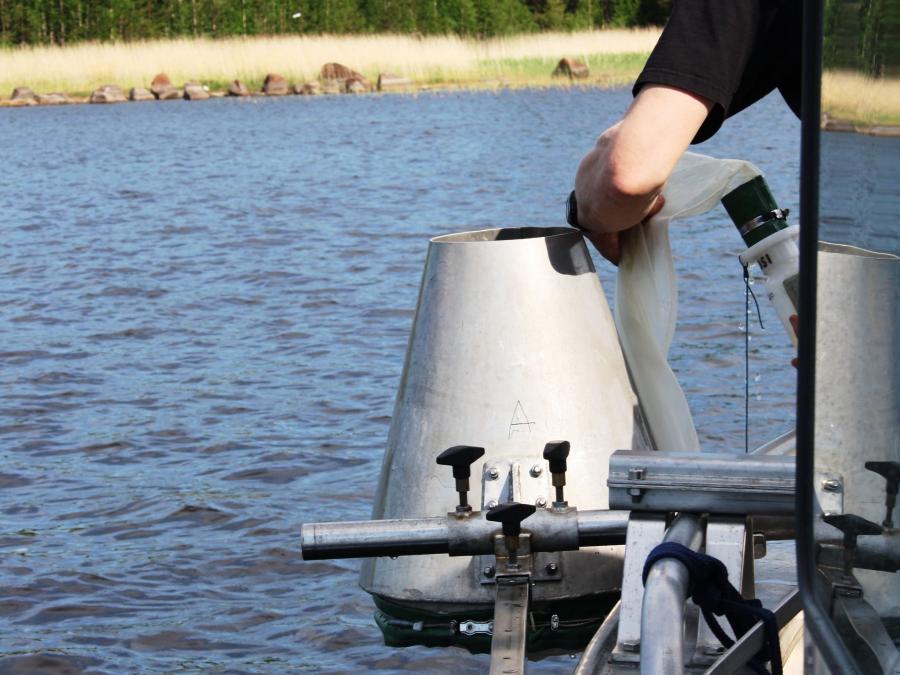Glossary (eng)
Some of the interface text in Estonian and Finnish is machine-translated
| The term in English | The term in Russian | The term in the Estonian | The term in Finnish | Term article | Photo |
|---|---|---|---|---|---|
| Green algae (Chlorophyta) | Зеленые водоросли (Chlorophyta) | Rohevetikad | Viherlevä | A paraphyletic group of algae which consist of over 7000 species. Green algae can be found in a variety of aquatic habitats. |
|
| Greenhouse effect | Парниковый эффект | Kasvuhooneefekt | Kasvihuoneilmiö | The accumulation of gasses in the atmosphere that act like the glass roof of a greenhouse, letting sunlight in but trapping the radiant heat. |
|
| Gulf | Залив | Laht | Lahti | (1) Gulf (coast) is relatively large part of an ocean or sea extending far into the land, partly enclosed by an extensive sweep of the coast, and opened to the sea through a strait; the largest of various forms of inlets of the sea. It is usually larger, more enclosed, and more deeply indented than a bay. (Glossary of Geology). (2) Gulf [geomorph] is a deep, narrow hollow, gorge, or chasm; e.g. one of the long precipitous stream-worn excavations west of the Adirondack Mountains in northern New York State. (Glossary of Geology). (3) Gulf [karst] is a steep-walledclosed depressionhaving a flat alluviated bottom; in some gulfs a stream flows across the bottom (Monroe, 1970; Glossary of Geology). |
|
| Gulf Ichtyoplankton sampler | Пробоотборник ихтиопланктона | Ihtüoplanktoni proovivõtuvahend | Gulf-poikashaavit | A paired surface Gulf sampler, which is attached bilaterally on the bow of the boat and is used to sample pelagic, newly-hatched fish larvae, such as Baltic herring, perch or pike perch, in shallow water in coastal area. Sampling depths may vary between 0 m and 1.5 m, even though fixed sampling depths of e.g. 0.5 m and 1.0 m with fixed sampling effort (haul, speed) are often used. |

|
| Gyttja | Гиттия | Järvemuda, jütja | Lieju | A sediment deposited in eutrophic lakes and seas, consisting of microscopic and submicroscopic remains of organisms living in the basin, with an appreciable mineral content added, as found in Sweden. It is only weakly soluble in KOH, yielding an extract that is never dark brown but may be colorless, yellowish, or greenish (Faegri and Iversen, 1975, p.74). |
|
| Habitat | Местообитание | Elupaik | Elinympäristö | Physically distinct areas of seabed associated with suites of species (communities orassemblages) that consistently occur together. See also Potential habitat. |
|
| Habitat forming species | Виды-эдификаторы, средообразователи | Elupaika moodustavad liigid | Elinympäristöjä muovaavat lajit | (umbrella forming species, habitat creating species, habitat engeneering species, ediphicators, ecosystem engineers) any organism that creates or modifies habitats. Jones et al. identified two different types of ecosystem engineers:Allogenic engineers modify the environmentby mechanically changing materials from one form to another. Beavers are archetypal ecosystem engineers; in the process of clearcutting and damming, beavers alter their ecosystem extensively. Different types and numbers of other organisms will thrive in the region of a beaver dam than would in a non-dammed region. Caterpillars that create shelters from leaves are also creating shelters for other organisms which may occupy them either simultaneously or subsequently.Autogenic engineers modify the environment by modifying themselves. As trees grow, their trunks and branches create habitats for other living things. In the tropics, lianas connect trees, which allow many animals to travel exclusively through the forest canopy.Humans are very significant allogenic engineers, Reference: Jones CG, Lawton JH and Shachak M 1994. Organisms as ecosystem engineers. Oikos 69: 373-386 |
|
| Habitat mapping | Картирование метообитаний | Elupaikade kaardistamine | Habitaattikartoitus | Plotting the distribution and extent of habitats to create a map with complete coverage showing distinct boundaries separating adjacent habitats. See also predictive spatial distribution modelling. |
|
| Halocline | Галоклин | Halokliin (ehk soolsushüppekiht) | Halokliini | Vertical zone in the oceanicwatercolumn in whichsalinitychanges rapidly with depth, located below the well-mixed, uniformly saline surface water layer Source: Encyclopaedia Britannica. |
|
| Haploid | Гаплоид, гаплоидный | Haploidsus | Haploidi | Organisms or more commonly life cycle stages of organisms that have only one set of chromosomes in their cells. |
